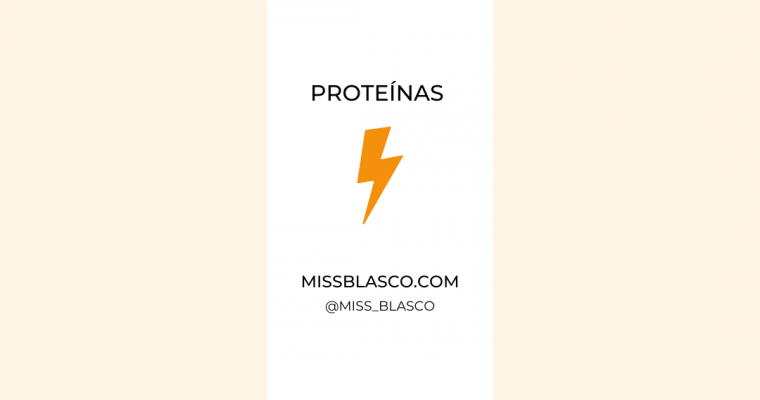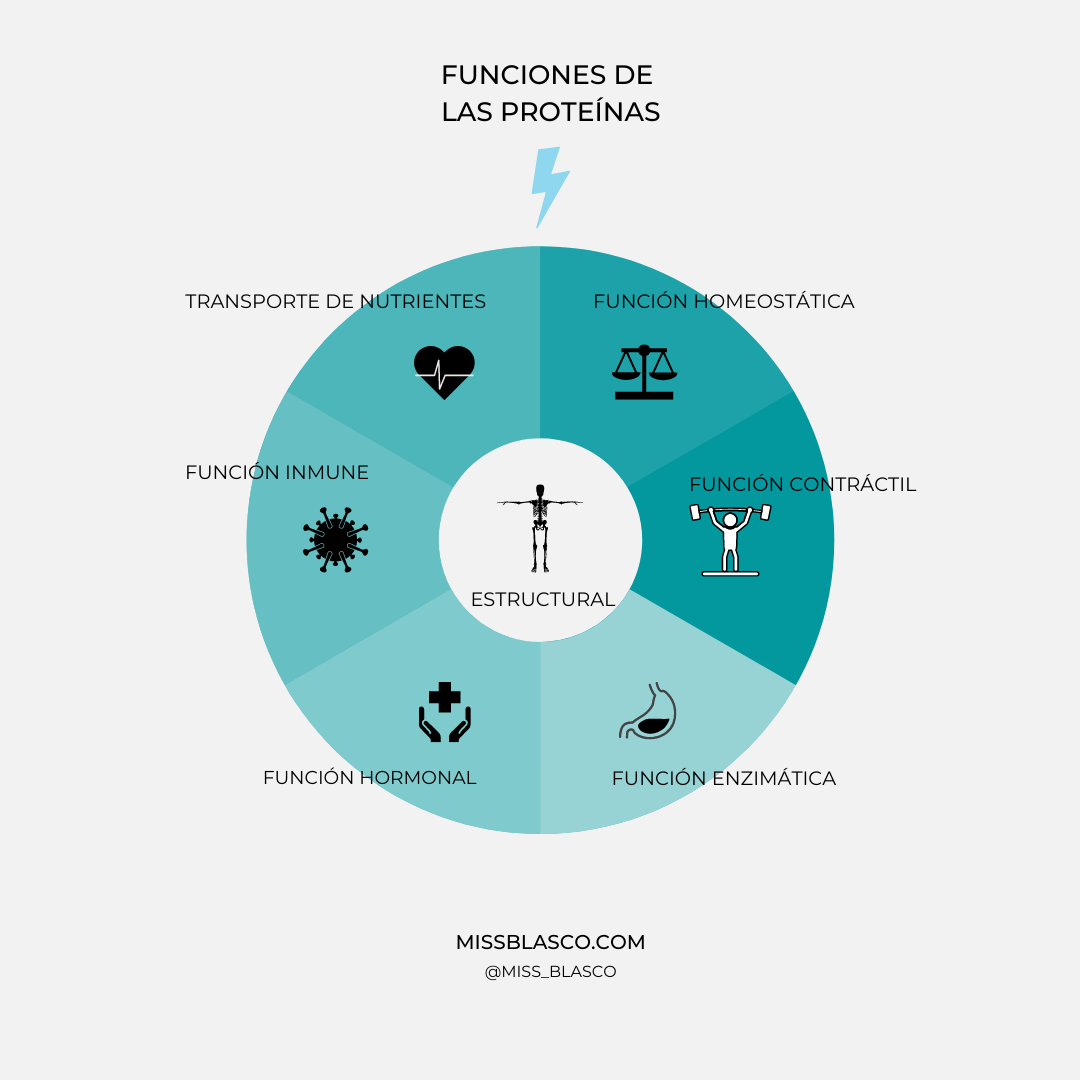
PROTEINS IN THE DIET
The importance of proteins in the diet, what functions they perform in our body, what dietary sources we can use, how much we need and how to obtain it in vegan and vegetarian diets.
I also talk to you about its importance in sports and I leave you some bibliographic references of interest, if you are interested, continue reading.
Knowing the best dietary sources of protein and knowing what the general requirements are will help us design the most appropriate diet for our own needs.
Functions of proteins in our body:
Proteins perform very important functions in our body since they are essential for maintaining good health at any age.
One of the main ones is the structural function, proteins contribute to the formation of tissues, they contribute to their resistance and elasticity, to the muscle formation and maintenance.
In addition, proteins are necessary to transport (transport function), what do they transport?, sodium and glucose / galactose into the cells, if these transporters do not work (SGLT and GLUT), our metabolism can be seriously affected.
Hemoglobin transports oxygen in the blood and myoglobin oxygen in the muscles, lipids are transported by lipoproteins.
In addition to these two very important functions, proteins have:
- Enzymatic function (pepsin)
- Hormonal (insulin and glucagon)
- Homeostatic (maintenance of the pH of the internal environment)
- Reserve (of amino acids for embryo development)
- Defensive
- Contractile(muscle movement, including the heart)
Do you realize how important it is to consume quality proteins? Don’t underestimate them or ignore them.
Pay attention to the amount of protein you consume in your diet; it performs many fundamental functions in our body.

Protein requirements:
On average, it is recommended that adults consume 70 g of protein per day, which cannot be taken as an exact amount. It would be more correct to prescribe 1.2 g of protein per kg of weight per day for healthy individuals with light physical activity.
In this way, the recommended daily amount would vary depending on the height and weight of the individual as well as their level of daily physical activity.
It’s very simple, If you are a woman, with an active life, but not an athlete, and you weigh 58 kg, you should consume 69.6 g of protein/day, as you can see, it is close to that amount.
Obviously there are many exceptions, this would be a general rule in healthy individuals, but it varies during pregnancy, menopause or if you exercise a lot, in the case of athletes and professional athletes, it obviously increases.
Good sources of protein are both foods of plant origin and foods of animal origin.
Now that you know a little more about proteins, perhaps it is time to talk about the foods that provide them to a greater extent.
It is important that the sources of protein in our diet come from foods of quality.
Foods rich in protein:

Combining all these foods with each other and especially with vegetables and fruits will make our diet varied and rich enough.
There is a trick that never fails in any diet, include many colors, quality proteins with quality vegetables, equal to diet of quality.
The consumption of protein in the diet is important in childhood, in adulthood and especially important from the age of 50, when notable hormonal changes occur in both men and women.
Have you heard of sarcopenia? It is the loss of muscle mass as a consequence of age, or rather, aging.
The best way to combat it is strength training combined with a correct intake of pprotein in the diet.
Similarly, when cachexia occurs, a medical condition associated with immune system diseases and cancer, an appropriate protein intake will be essential, and a good way to combat it.
A correct protein intake can be quite a challenge when we talk about vegetarian and vegan diets.
The challenge of proteins in vegetarian and vegan diets:
Many people follow vegetarian or vegan nutritional plans, and often the amount of protein consumed is compromised.
The intake of complete proteins is especially complicated in vegan diets. In vegetarian diets, the contribution of dairy products and eggs helps, but vegan ones must resort exclusively to proteins of plant origin.
To obtain the necessary proteins in the vegan diet, it is necessary to pay special attention to protein supplementation and the supplementation of some vitamins that are only obtained by consuming foods of animal origin is inevitable.
The plant-based foods that provide the most protein are firm tofu, tempeh, seitan, textured soy, legumes, nuts (almonds, hazelnuts, walnuts) and vegetables.
Pseudocereals such as quinoa, buckwheat and amaranth are also good sources of protein, although in some cases, like legumes, they contain limiting amino acids.
All of them are good sources of protein and can also be implemented in a low-carb diet, thus facilitating the planning of diets that are both “low carb” and vegetarians/vegans.

Proteins and sports:
Protein intake in athletes is a crucial topic on which much has been written. It has always been said that athletes need to consume more protein than sedentary individuals, but the exact amount in each case depends on many factors.
Protein requirements in athletes depend on many factors; they cannot be generalized.
Auker Jeukendrup in his book A Practical Guide to Sports Nutrition, states:
“Typically, the recommendation for strength athletes is 1.4-1.7 g of protein per kg of body mass/day”, and a lower amount for endurance athletes, between 1.2 and 1.6 g of protein per kg of body mass/day.
But he also says that these recommendations should be taken as a mere starting point.
Depending on the type of protein, the timing of its consumption in relation to exercise, and whether other foods are eaten at the same time, muscular response can vary.
And of course every individual is different and experiences responses different.
Regarding protein consumption, it is important to highlight the “when”, the best is a balanced distribution between the three main meals of the day.
What is the best time to ingest protein? It has always been said that just before exercise or during the 2 hours following.
This is not entirely true, if the intake of total proteins in the diet is adequate, the benefits of training will also occur.
What is important is the distribution of these throughout the day, providing 1/3 of the total in each of the main intakes.
It is not worth having breakfast without proteins, eating at midday with very little protein and consuming them all at once at dinner, it does not matter if you are an athlete or sedentary.
And what type of protein is the best?
There is no evidence that protein supplements are the best way to increase your intake, recent research shows that protein from food generates similar muscular responses.
And finally, it is very interesting to highlight that to gain muscle mass it is not necessary to consume excessive protein, above 1.7-2 g of protein per kg of body mass/day, the protein is oxidized and does not contribute to muscle anabolism.
In summary, ingesting between 0.8 g and 2.5 g of protein per kg of weight per day is safe, should not have side effects and is good, but exceeding that amount does not provide any additional benefits.
Essential amino acids contribute to the creation of muscle mass.
And if the goal is to build muscle mass, protein consumption will help us achieve it.
Essential amino acids, such as leucine, are what we need, not so much the consumption of carbohydrates that stimulate insulin, which can interfere with it.
Related posts:
- Vegan diet, what is protein supplementation.
- Legumes and antinutrients.
- How to germinate lentils at home.
- How to germinate mung beans at home.
Bibliographic references:
- Campillo, A. and García-López, J.A. (2015). Food for athletes. Barcelona, RBA.
- Jeukendrup, Asker. (2011). Practical Guide to Sports Nutrition. Madrid, Ediciones Tutor.
*All of these recommendations do not constitute medical advice. I am a Dietetics Technician and a Nutrition Degree student. My current area of expertise is the development of personalized dietary plans, nutritional education, and dissemination.
*If you found this content interesting, please share it.
BLOG, DIETÉTICA, HIGH PROTEIN, NUTRICION, PROTEÍNAS, RECETA VEGANA, VEGETARIANO